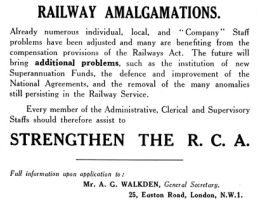Posted 22nd July 2011 | 1 Comment
Rail unions reveal merger talks are under way

A 1923 advertisement by the Railway Clerks' Association, now TSSA
TALKS have been agreed over a possible merger between the RMT and TSSA, it has been revealed. The general secretary of the RMT, Bob Crow, said it was an historic day.
The talks may result in a full merger, although at first the discussions will focus on closer working, initially through a federation structure, with a view to moving towards a complete merger later on.
Both unions also agreed that the door will remain open for other smaller transport unions to join the discussions in due course.
The general secretary of TSSA, Gerry Doherty, said: "Today’s decision will hopefully be the start of a process designed to serve the interests of future generations of transport and travel trade workers. We owe an obligation to our children and our children’s children to leave better organisations that protect workers in the very uncertain future that they currently face.”
The RMT presently has 80,000 members. A spokesman for the union told Railnews: "With a full merger, the result would be a powerful union, with more than 100,000 members."
If the RMT and TSSA did join forces, ASLEF would remain as the last large union specialising in railway matters, although many railway staff are now members of another union, UNITE.
The Transport Salaried Staffs' Association, TSSA, was founded in Sheffield in 1897 as the National Association of General Railway Clerks, being renamed the Railways Clerks' Association, or RCA, in 1899. It gained its present title in 1951.
The RMT – the National Union of Rail, Maritime and Transport Workers – was formed in 1990 from a merger of the National Union of Railwaymen and the National Union of Seamen. The NUR itself went back to 1913, the year that it was formed from a merger of three existing unions.
Reader Comments:
Views expressed in submitted comments are that of the author, and not necessarily shared by Railnews.

Philip Russell, Carlisle, United Kingdom
I dont agree that most rail workers face a very uncertain future ,I know not everythings perfect for staff but train usage has grown massivlely in the last 10 -20 years and most staff pay rises have done ok as well, also the industry continues to get alot of investment in various major and minor projects despite a lot of cuts in spending in other areas ,if the unions are referring to the recent Mc Nulty report as a cause of great concern i think this too is unfounded because most of its echonomy measuers would have happened years ago had British Rail still been in existance ,it seemed to have far more vision and clout when modernising working practices and would not throw in the towel at the first threat of a strike .i know i worked on Network South East at the time .